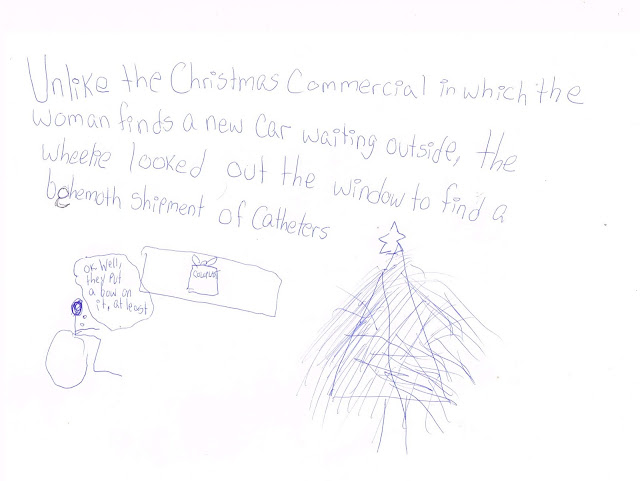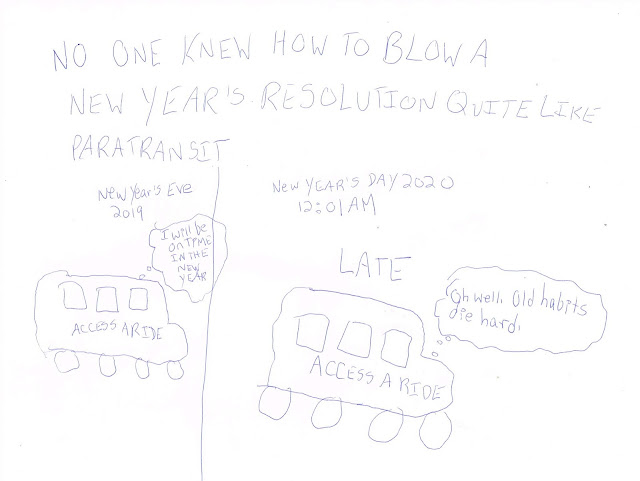When the Americans with Disabilities Act (ADA) was signed on July 26, 1990, society changed for millions of disabled Americans. I wouldn’t even be born for 3 more years, but I like to think the many, many courageous activists and ordinary people who shared their stories in support of the ADA were smoothing out a path for me. It takes tremendous love to raise your voice and your fist for people yet unborn, for people you may never meet. That is what most moves me on this anniversary, that three years before my birth, Justin Dart, Ed Roberts, Judy Heumann, Bradley Lomax, and thousands of other lesser known but equally important fighters could already see me.
And so too, they could see a world where my wheelchair and I could get into restaurants, shops, office buildings, schools, and swimming pools. Where I could realize a once radical dream of going to a “mainstream” elementary school, high school, and eventually graduate school. Where people like us were no longer hidden away. To love someone that deeply simply because they are human is an incredible act of goodness for which I can never repay these warriors. But I will always try, with my words and with my actions.
In the midst of the gratitude I feel for the tremendous progress of the last 29 years, it’s naïve to think that I am regarded today as a truly equal citizen. While my rights go as far back as the God that made me, on paper, they have been recognized for less than three decades. That should astound you, as it does me, knowing that disabled folks have been here since the dawn of time.
Yet I know that a truly equitable society requires much more than a law. Structures with ramps and wide doorways and raised toilets mean so little if they are not paired with attitudes that not only accept us, but celebrate us. And I know too well that an attitude can’t be legislated.
I still see people like me literally applauded for existing, because expectations for us are stunningly low. I still see the surprise when disabled folks are the best at anything, from singing, to dancing, to cooking, to fill in any given activity. Because “those people” are cute and all, but they’re not really supposed to be good at anything, are they? So many people want to click, “be inspired” and move on without ever really asking about (or listening to) the actual needs of disabled people.
The irony of this “post ADA” America is that a huge fraction of those “inspired” by disabled folks vote for policies that actively destroy our lives by defunding Medicaid, the only major payer of long-term care services that keep us out of nursing homes. They do little to disrupt the system of often unsanitary, unsafe nursing homes that snatch our freedom, because some of them think we belong there, whether they’ll say it out loud or not. And most probably do not know that I lie awake at night terrified that institutionalization will snatch me too. Because even with a loving family, the system is slanted towards putting us away. When bureaucrats quietly and without reason decide to grant disabled people insufficient home care services to survive, they often leave us no other choice but to be swallowed by the institutions that shape my deepest fears. I beg you to consider what it feels like to worry that I will be thrown away like those disposable straws we stubborn wheelfolk have insisted on keeping. (“Those people” don’t actually need to drink anything, do they?).
I have, nearly three decades after the ADA, been told that it’s a shame that I’m disabled, because I’m very pretty. I have been told, in cheery tones, “I don’t even think of you as disabled!” as if ignoring a deep, essential part of me is a compliment. An instructor at one of the best universities in the country sneered that “people with disabilities are used to getting things on a silver platter” when I, as a lost, scared freshman asked for help finding a book.
I have learned to reclaim the word cripple as a crisp, concise term of affection among disabled friends. It feels good to help a word used against us to evolve into one of love and power. And yet, I have also felt the sting of that word hurled as a slur out the window of a car full of fraternity brothers. That was some welcome back to campus.
By the time I was 13 years old, between the lack of accessible facilities and a psychologically abusive “caregiver,” I felt compelled to deny my body water, in the hope that I could just get home before I had to pee. In the cafeteria of my junior high, I’d sometimes wet my lips and spit the water back out.
Do you know what that’s like to fear the very thing that makes up 60% of your being?
I still don’t see bodies that look like mine in movies and magazines. And when they do feature a person in a wheelchair, that person sits in a sporty wheelchair, has muscular arms, no sign of atrophy, no curved fingers, no sign of needing any physical help. That person does not reflect my reality. There are bigger fish to fry, yes, but frying so many fish, every single day, is exhausting as hell. Does the size of the fish really matter?
The architectural standards that are the meat of the ADA are frequently an afterthought, if they are a thought at all. I have never been able to ride the train at my local station. A nurse’s aide at a prestigious hospital told my mother, while stating that she didn’t lift, that the hospital floor was for “people who walk.” Except she didn’t say walk; she mimed walking, in a condescending manner I keep replaying in my head. Every time I see a character with a disability, I silently pray that the story won’t end in magic healing or suicide. I worry that one day when I die, someone will say “at least she’s walking in Heaven,” unaware that a Heaven in which I would not recognize myself is not a Heaven at all.
Did you know I almost wept the first time a non-disabled person asked me if I want children? It is so uncommon for anyone to see us as potential parents that I thought no one would ever ask.
And yet, I know that all of these struggles are infinitely more complex for my multiply marginalized siblings in the movement, disabled people who are black, brown, LGBTQ, undocumented.
On this 29thbirthday of the ADA, we as disabled people must also consider the ways we have let each other down. To this day, within our own community, we build pointless hierarchies among ourselves, constantly debating who “has it hardest.” On at least a weekly basis, I hear physically disabled folks tout their lack of cognitive disability, as if our siblings with cognitive and psychiatric disabilities are somehow less worthy of respect. I still observe a disdain in our community for what I call “doubly disabled couples” as if having an able-bodied partner proves a superior kind of normalcy. Our community still centers disabled people that are white, heterosexual, cisgender, males, and as a person of privilege, I must do my best each day to make space for those our movement too often ignores. We split into harmful factions by disability type, forgetting that the enemy is ableism, not each other. We owe it to ourselves to have many difficult, necessary conversations.
On July 26, 1990, President George H.W. Bush declared, “let the shameful wall of exclusion finally come tumbling down.” The truth is, the wall is still tumbling and won’t truly fall until our laws and our attitudes are truly grounded in intersectional disability justice.
If you’ve read this far, you perhaps think I’m “angry.” Maybe I am. Maybe we all should be. Because we are capable of so much more.
Image: Kathleen wearing a blue "disability power" shirt designed by her friend Cole Anderson. She is seated in a wheelchair with a fist extended upward in front of an "I love NY" logo.
















